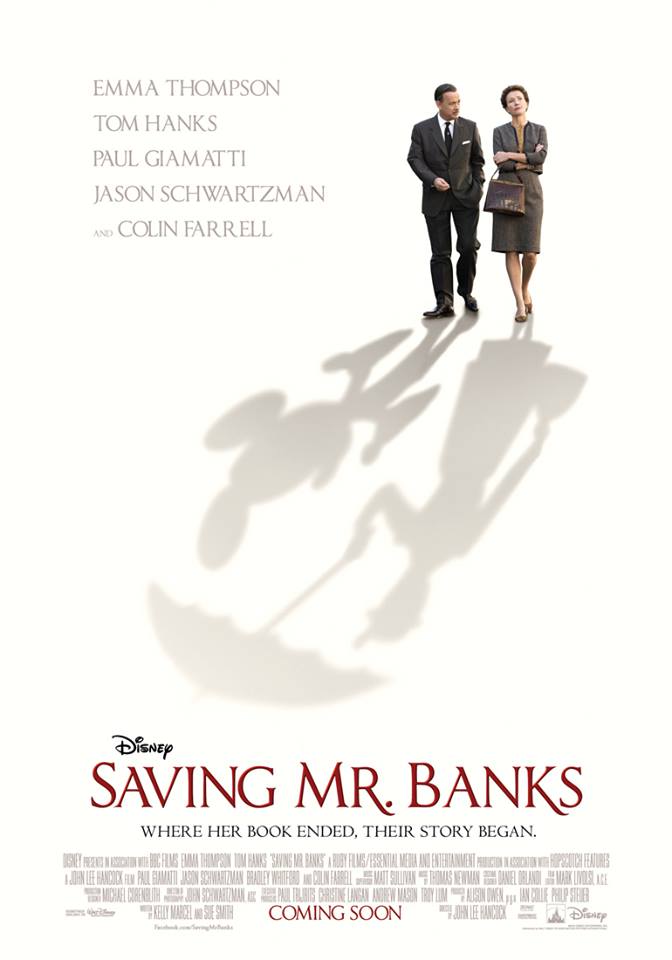P.L. Travers (Emma Thompson) is lured to Hollywood to sell the rights to her successful novel Mary Poppins to movie mogul Walt Disney (Tom Hanks). Disney is desperate to bring the book to the screen as promised to his daughters and gives up many means of control to secure the rights. Travers begins the process of adapting the novel for the screen with writer Don DaGradi (Bradley Whitford) and the musical team of the Sherman brothers (Jason Schwartzman and B.J. Novak). Throughout this process, Travers reminisces over the inspiration of the novel – her harsh upbringing in Australia with her alcoholic father (Colin Farrell). She also proves to be a nightmare collaborator who will not sign away Mary Poppins without strict adherence to her demands including: no animation, no singing, no colour red, no made up words and no Dick van Dyke…”
The premise of the movie is the making of a classic musical. Similar ground has been covered in last year’s Hitchcock and even in Marc Foster’s Finding Neverland which is more of a spiritual companion to John Lee Hancock’s film. Screenwriters Kelly Marcel and Sue Smith are not just interested in regaling Hollywood legend but cross examining the inspiration for one of literature’s and film’s best loved characters. These flashbacks however seem overbearing and over abundant and many emotional beats are needlessly repeated.
Travers is a fascinating character – one who reinvents herself after a troubled upbringing and positioned herself into a rare level of power over Hollywood’s most powerful figure. Travers’ wrangling and various demands are fabulously entertaining delivered by exceptional talent. Emma Thompson is distinguishingly marvellous and gives a performance which will surely be recognised with an Academy Award Nomination. Her Travers is hilariously vexatious as she neutralise everyone around her with her draconian wit. However, Thompson’s performance is more than biting quips. The flashbacks which give us a sense of the young Travers growing up inform her later years. Travers lives alone in London and is hopelessly lost in the alien environment of Los Angeles. Her treasured work is the only thing she has and this melancholy is perfectly distilled by Thompson with knowing looks and resigned body language. Thompson’s scenes with Paul Giamatti (as chauffeur Ralph) also give an insight into a woman with demons she can’t let go of and something more than a barking autocrat.
Tom Hanks too deserves praise in his portrayal of Walt Disney. Hanks brings that rarity of star power to the role that only someone of the two time Academy Award winner can bring. Disney’s introduction to the film standing in front of a bookshelf littered with Oscar statues almost makes Leonardo DiCaprio’s introduction as Jay Gatsby seem understated. However, Hanks conveys a presence and an aura as Disney that very few actors could achieve. One can bemoan the lack of screen time given to the Mickey Mouse creator and pine for a more in-depth and subjective portrayal of the legendary mogul.
The rest of the cast including Bradley Whitford as hapless screenwriter Don DaGradi, Jason Schwartzman and B.J. Novak as the legendary Sherman brothers are also terrific entertainment. The latter two in particular leave one yearning again for a film devoted to the careers of the Sherman brothers who wrote so many unforgettable classics for Disney movies. Colin Farrell is perfectly adequate in his role as the rebellious and troubled father even if he struggles with the Australian accent. While not quite veering into Dick van Dyke chimney sweeper territory, Farrell seems to sound more cockney than Aussie.
The fabulous cast and the perfectly entertaining screenplay cannot elevate the film above pleasantly enjoyable. There are perhaps one too may needless flashback scenes and an unnecessarily long running time. There is even more material during the credits – a tape recording of the real Travers acridly haranguing her collaborators a trope Disney picked up surely from its recently acquired Marvel Studios. The direction of John Lee Hancock (from The Blind Side) is too unimaginative to elevate the material above its station. However, by casting the film with consummate performers, Saving Mr. Banks is redeemed with enough sugary charm that it will go down in the most acceptable way.

